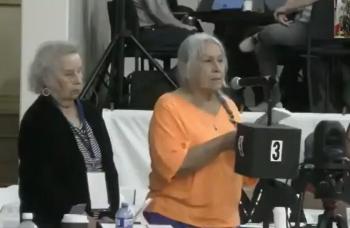Image Caption
Ray Owl was awoken in the middle of the night by a spirit, an old man. ‘Wake up!’
Ray got out of his bed and sat in his kitchen in the middle of the night. Across the table from him sat the old spirit and he spoke to Ray for a long time in the old language.
From that day on, Ray has led a fight to stop the aerial spray of glyphosate on the forest and the waters, said Caroline Recollet, who told the story of Ray’s spirit encounter at the Chiefs of Ontario (COO) annual meeting in June.
Recollet and Evelyn Roy of the Traditional Ecological Knowledge Elders group that Ray Owl founded, spoke to a resolution calling for a ban of glyphosate-based herbicide aerial spraying. Owl is an Elder from Sagamok Anishnawbek First Nation. He wanted to address the chiefs himself about the glyphosate threat to traditional food systems, but health issues prevented that.
The chiefs were told that glyphosate is used to control vegetation around hydro transmission lines, something First Nations at one time would manage manually and without chemicals. Now, to save money, the ministry of Natural Resources uses helicopters and planes to spray forests.
Eight of 10 provinces have some sort of regulation against the use of the product, chiefs were told. It’s been banned by Quebec in their forestry practice since 2001. In 2017, Ontario made it illegal for glyphosate products to be used for cosmetic use on lawns. It’s been banned or heavily restricted in more than 40 countries.
Glyphosate is poisoning and destroying the whole ecosystem, the forest, the animals, the plants. “Our medicines are suffering,” Recollet said. The waters, the trees, the plants, the food… “those blueberries that we pick”, all of the other things that are foraged, “we cannot eat those anymore,” she said.
Chief Wilfred King of Gull Lake First Nation spoke in favour of the ban of glyphosate spraying. It’s known as Round Up and as Agent Orange, used as a defoliant in the Vietnam war, King said.
“This is a very poisonous substance…It’s a cancer-causing agent.” Gull Lake First Nation has been against its use in their territory since the 1990s.
“We strongly feel that this is impacting not only the health of our citizens… it’s having a real negative impact on the animals, especially moose that we eat.”
“We’ve got to put a stop to this once and for all,” King said, adding the spray violates the constitutionally protected rights of First Nations to fish, hunt and gather.
Be it resolved that the chiefs in assembly advocate for the Ontario and Canadian governments to abolish glyphosate-based herbicides within the traditional territories of Ontario’s First Nations; that the chiefs intervene at the upcoming Pesticide Management Review Agency review of glyphosate in opposition to the use of this product; retain a scientist to develop a position paper of key concerns; e.g. bioaccumulation, risk to human health, and impacts to water; seek a hearing from the Lands Tribunal if the federal review does not get the intended result. These items were part of the motion before the chiefs.
In speaking to the motion, Shelly Moore-Frappier of Temagami First Nation said that on Sept. 10 last year the nation declared a ban on all herbicide spraying in the territory. A truck carrying the herbicide concentrate spilled 600 liters into a ditch. They had to relocate their moose hunt camp.
“That was the last straw that we had in regard to glyphosate’s use in our territory and our homeland... They don’t let you spray this on your lawns in towns, but they’ll spray this all over the bush.”
Cynthia Westaway reminded the chiefs that Chapleau Cree First Nation, Missanabie Cree First Nation and Brunswick House First Nation have litigation before the courts against the use of the herbicide spraying in the boreal forest. The legal action includes support from the Nishnawbe Aski Nation.
She also provided a brief update on the litigation by Ecojustice lawyers against Canada. A Federal Court found that Health Canada’s 2022 decision to approve the glyphosate-based herbicide Mad Dog Plus was “unreasonable.”
“…the Court noted that Health Canada’s 2022 conclusions that glyphosate-based pesticide products continued to pose acceptable risks was unsubstantiated by any scientific analysis,” reads the Ecojustice website. “The Court set aside the renewal of the product, giving Health Canada six months to make a new decision on the renewal that transparently addresses new science on glyphosate risks.”
“The use of glyphosate is widespread in Canada, with an alarming 50 million kilograms per year sprayed on foods and forests,” reads the site. “The use of toxic pesticides like glyphosate is on the rise in Canada. A new report from Ecojustice reveals that Canada is now the fifth largest user of pesticides in the world, with sales increasing a staggering 47 per cent in just a decade. These pesticides pose potential harm to the health of humans and the environment.”
Chief King said the motion before the chiefs was “long overdue.”
Recollet said “We leave you with Ray’s words from the spirit. ‘You are killing our people and our forests, and our friends and our medicines. We cannot continue to survive… unless we stop this'.”
Motion carried.

